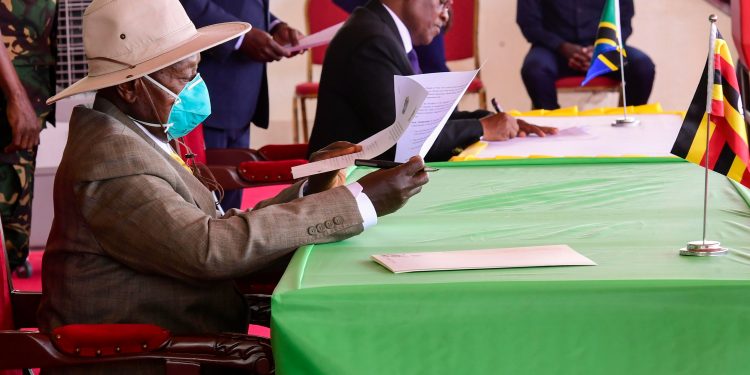Tanzania’s President John Magufuli and Ugandan President Yoweri Museveni signed an agreement on Sunday in Chato, northwestern of the southern neighbor paving the way for the construction of a crude oil pipeline running from Ugandan oilfields to the port of Tanga.
Museveni’s office tweeted; “In principle, we agreed that our governments expedite the harmonization of pending issues in the spirit of the East African Community (EAC), the remaining agreements be fast-tracked including the Tanzanian HGA and we quickly carry out the implementation of EACOP project.”
The agreement on the pipeline construction comes days after French oil company Total said it had reached an agreement with Uganda protecting its rights and obligations in the pipeline’s construction and operation – known as the host government agreement. The Friday (September 10, 2020) afternoon meeting at State House Entebbe and was presided over by President Museveni, and witnessed by Mr. Patrick Pouyanne, the Chairman and Chief Executive Officer of Total.
“Our oil will be used to develop our infrastructure, and ICT to enhance durable capacity of our country,” President Museveni said.
Having discovered oil reserves in 2006, the country needs the planned 1,445-km (900-mile) East African Crude Oil Pipeline to be in place to start commercial production. The pipeline is estimated to cost $3.5 billion, according to the two governments.
80% of the pipeline will run through Tanzania.
Tanzania will earn 7.5 trillion shillings ($3.24 billion) and create more than 18,000 jobs over the next 25 years, or more, that the project is in place.
The Museveni government has not given a date for when construction of the pipeline will begin but said last year that once construction begins, it would take 2-1/2 to three years to complete.
Total is the major shareholder in Uganda’s oilfields after agreeing in April to buy Tullow Oil’s entire stake in the jointly held onshore fields in Uganda for $575 million.
Tullow said last week it was confident of finalising the sale in the fourth quarter of this year.
The other partner in the 230,000 barrel-per-day project is China’s CNOOC.











